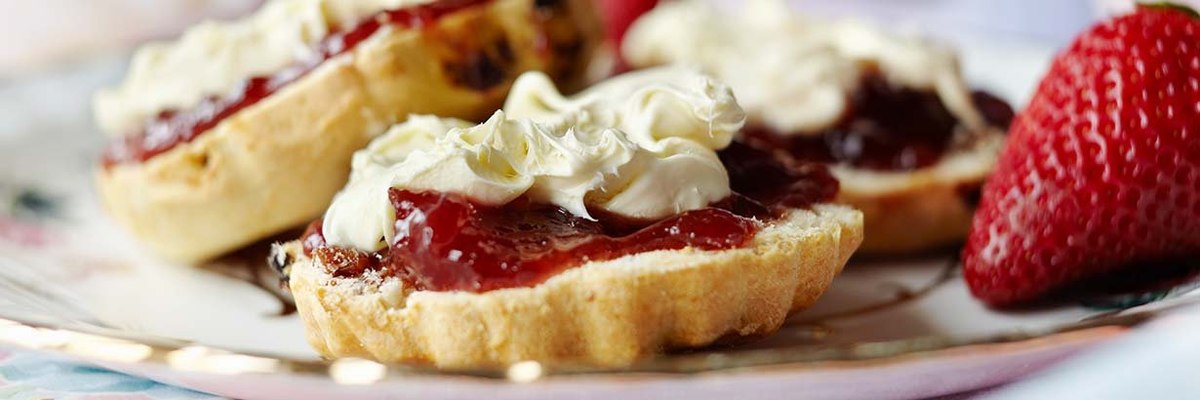Is it scone as in ‘bone’, or scone as in ‘gone’?
The debate on whether you should pronounce ‘scone’ to rhyme with ‘gone’ or with ‘bone’ has been going on forever. There is evidence of people making light of the distinction as far back as 1913, with a poem in Punch Magazine:
I asked the maid in dulcet tone,
To order me a buttered scone,
The silly girl has been and gone,
And ordered me a buttered scone.
Neither side looks likely to win the argument any time soon however, with a recent YouGov study of more than 54,000 Britons finding that 51% say they pronounce the word to rhyme with ‘gone’ but 45% saying they pronounce it to rhyme with ‘bone’.
While the scone pronunciation map of England does not follow traditionally recognisable boundaries, there are still some very clear geographic trends. The most obvious of these is the strong tendency to use the ‘gone’ pronunciation in the northernmost reaches of England. In the counties of Northumberland, Durham, Cumbria, and Tyne & Wear, fully 84-88% use the ‘rhymes with gone’ pronunciation.
Extending a little further south and we still find large majorities using the ‘gone’ pronunciation for scone, including 83% in Merseyside and 69-70% in Lancashire and North Yorkshire.
However, going just a bit further south again lands you in the most pro-‘scone as in bone’ counties in the country, with 78-79% in Derbyshire and South Yorkshire pronouncing it this way. Along with East Yorkshire and the wider East Midlands, this area of England is the national ‘bone’ bastion. Outside of this area only in Essex (69%) and Cornwall (58%) do a clear majority of people prefer the ‘bone’ pronunciation.

Many other areas of England are divided, particularly Somerset, Greater London, Cambridgeshire, Hertfordshire, East Sussex, and Suffolk, which are almost exactly split.
The regional divide in Wales is much clearer, with a stronger preference for ‘scone as in gone’ in North Wales (74%) and Mid Wales (70%) than in South East and South West Wales (51-55%).
Meanwhile in Scotland there is a strong preference for ‘scone as in gone’ across all regions, from a ‘low’ of 68% in the Aberdeen and North East Scotland region to a high of 81% in the Edinburgh and the Lothians region.
Should you put jam or cream on scones first? The Devon vs Cornwall dispute
A map that perhaps makes more sense at first glance is our county map showing what order people add jam and cream to their scones. This topic is hotly disputed, with proponents of the so-called ‘Cornish method’ insisting that jam should go on first, while the rival ‘Devon method’ advocates the application of cream ahead of jam.
Fittingly, both counties are the most likely in the country to practice the method that bears their name. However, while the Cornish method is by far the most common choice in Cornwall (80%), the same is not true in Devon, where people are in fact split on whether they go cream first (49%) or jam first (46%).

Only in neighbouring Somerset is the Devon method practiced by more than four in ten people (being split exactly 47%-47% on which method they move). Throughout the rest of the country the Cornish method is the most common by wide margins.
Given the distinctly red tone of the map above, it is no surprise to see that the overall national results show a heavy lead for jam-firsters, which is practiced by 62% of Britons compared to 28% for the cream-first opponents.
However, there is a glimmer of hope in the long run for cream-firsters. Breaking the results down by age shows that the Cornish method’s dominance diminishes as the public get younger. While fully 80% of the over-70s dollop jam on their scone first, this falls to 48% among the under-30s.
There is still farther to go – still only 38-39% of the under-40s practice the Devon method – but on current trends we could start to see some crossover in coming generations.
How do you think 'scone' should be pronounced, whether jam or cream should go on first, and everything else? Have your say, join the YouGov panel, and get paid to share your thoughts. Sign up here.
Photo: Getty







